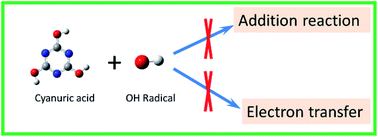Recalcitrance of cyanuric acid to oxidative degradation by OH radical: theoretical investigation†
Abstract
Cyanuric acid (CA) is among the several organic compounds that are resistant to oxidative degradation in advanced oxidation processes (AOPs). In the present study, the reaction between CA and ˙OH radical (the primary reactive oxygen species in AOPs) was investigated by density functional theory and compared with the reaction between 1,3,5-benzenetriol (BT) and ˙OH radical. The results indicate that compared to BT, the two tautomers (enolic form and keto form) of CA have difficulty in thermodynamically and kinetically reacting with ˙OH radical via both the addition to the triazine ring and electron abstraction. Although the reaction for the enolic form of CA was found to be much more favorable than its keto form, the small population of the enolic CA, because of its thermodynamic unstability, makes it less competitive. The reason for the recalcitration of CA to ˙OH radical is attributed to the electron deficiency of the triazine ring because of the higher electro negativity of N atom compared to that of C atom.


 Please wait while we load your content...
Please wait while we load your content...